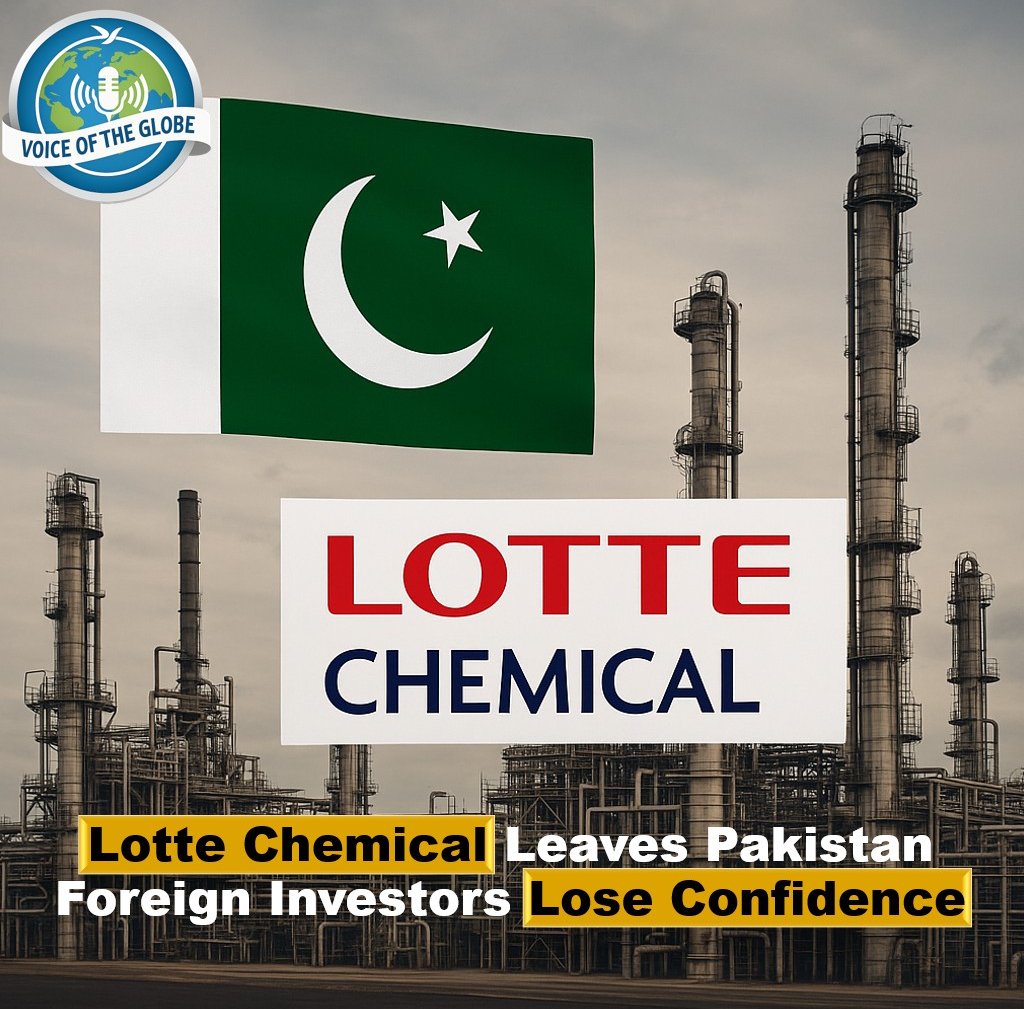Lotte Chemical Pulls Out of Pakistan as Economic Troubles Deepen
South Korea’s Lotte Chemical Corporation has officially ended its operations in Pakistan after selling its majority stake in Lotte Chemical Pakistan Limited (LCPL). The exit marks the company’s complete withdrawal from the Pakistani market—a move largely seen as a reflection of the country’s ongoing economic challenges, unstable currency, and rising operational risks.
11/17/20252 min read


Lotte Sells Its Entire Stake — What Happened?
Lotte Chemical sold about 75–75.01% of its ownership in LCPL to PTA Global Holding, a UAE-based company. With additional shares acquired from minority investors, the new buyer now controls nearly 78.7% of the company.
Key points:
Buyer: PTA Global Holding (UAE)
Seller: Lotte Chemical Corporation (South Korea)
Deal value: Approximately 98 billion won, equal to around $67–69 million
Plant location: Port Qasim, Karachi
Production capacity: Around 500,000 tons per year of Purified Terephthalic Acid (PTA)
With this sale, Lotte has completely ended its presence in Pakistan after more than a decade.
Why Did Lotte Chemical Leave Pakistan?
Although the company described the sale as part of a “business restructuring plan,” several economic realities within Pakistan played a major role in this decision.
1. Rupee instability and financial uncertainty
Pakistan’s steep currency fluctuations, ongoing foreign exchange shortages, and the difficulty of transferring profits abroad have made long-term investment extremely risky. For a global company like Lotte, this created significant financial strain.
2. Constant energy and infrastructure issues
PTA manufacturing requires stable power and gas. Pakistan’s energy shortages, high fuel prices, and inconsistent infrastructure made operations costly and unpredictable.
3. Weak domestic demand and slow economic activity
High inflation, reduced purchasing power, and overall economic slowdown in Pakistan have hurt industrial demand. Lotte’s Pakistan-based unit had been feeling the pressure for several years, with rising costs and shrinking margins.
4. Global restructuring
On the international front, Lotte is shifting focus toward high-value specialty materials and trimming down less profitable global units, and Pakistan fell into that category.
Foreign Investors Are Losing Confidence
Lotte’s departure joins a growing list of global companies—including Shell, Telenor and others—that have either downsized or fully exited Pakistan due to:
Policy inconsistency
Currency depreciation
Heavy taxation
High energy prices
Unpredictable business environment
This trend signals declining foreign investor confidence at a time when Pakistan desperately needs long-term investment.
What Happens to Lotte Chemical Pakistan Now?
Despite Lotte’s exit, the company’s plant and operations in Pakistan will continue under the new ownership of PTA Global Holding.
Changes under the new management include:
Appointment of Adnan Afridi as the new CEO
Plans for expansion, mergers and acquisitions
Possible diversification into new industrial segments
So while the parent company has left, LCPL is expected to continue functioning and potentially grow under its new investors.
What Lotte’s Exit Means for Pakistan
Lotte’s decision reflects a bigger reality:
Pakistan’s economic instability is driving major companies away.
High energy costs and weak infrastructure are pushing industrial investors to seek safer markets.
The country’s industrial competitiveness is steadily eroding.
The loss of a global company in the polyester and PET supply chain also means reduced industrial depth and greater reliance on imports.
Conclusion
Lotte Chemical's withdrawal is more than just a business decision—it is a reminder of the serious economic challenges Pakistan faces. Currency instability, expensive energy, inconsistent policies, and weak demand have created an environment where long-term industrial investment is increasingly difficult.
Unless Pakistan improves its economic stability and investor confidence, more multinational companies might reconsider their presence in the country.
